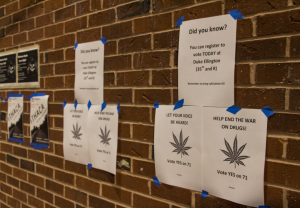
Initiative 71, which passed in November with 69 percent of the vote and which legalizes marijuana, will go into effect at 12:01 a.m. Thursday after the conclusion of a 30-day congressional review period.
Marijuana will be legal in Washington, D.C., at 12:01 a.m. tomorrow.
Mayor Muriel Bowser confirmed in a press conference Wednesday that the D.C. government would implement Initiative 71, which was passed in the November election with 69 percent of the vote, after the 30-day congressional review period expires at midnight.
“Our government is prepared to implement and enforce Initiative 71 in D.C.,” Bowser said.
In a press advisory sent out Tuesday, Bowser and D.C. Chief of Police Cathy Lanier outlined the guidelines and limitations of Initiative 71, which allows individuals who are 21 years of age or older to possess up to two ounces of marijuana, cultivate up to six plants for personal use and freely give up to one ounce to another person, who must also be at least 21 years old. The substance can only be used in private spaces.
“[Initiative 71] does not allow for the sale of marijuana, the use of marijuana in public spaces, the use of marijuana by juveniles,” Bowser said.
Under the principle of “home grow; home use,” the advisory emphasized that consumption of marijuana in public spaces, including restaurants and bars, the sale of marijuana or the operation of vehicles under the influence of marijuana are still prohibited. Since it cannot be bought, marijuana can only be grown or acquired as a gift.
Metropolitan Police Department officers have undergone training to ready themselves to respond in accordance with the new legislation. According to Lanier, new protocols will only differ slightly from those implemented last June when D.C. decriminalized marijuana.
“It’s not some major change or shift in what the officers do under decriminalization,” Lanier said. “We’ve been working on this for a while. … Our officers are going to be fully prepared for 12:01.”
The District’s efforts to legalize have received scrutiny and backlash from Congress.
In its omnibus spending bill passed in December, Congress included a policy rider that prevents the District from “enacting” any law that legalizes marijuana. Bowser and the D.C. Council, along with Del. Eleanor Holmes Norton (D-D.C.), argued that the initiative was self-enacting when approved by voters and thus legalization was ratified before the passage of the rider.
“We are of the same view that the initiative was enacted at the point that the voters voted and the board certified the results. Since the handling of legislation falls to the legislative branch … I sent the legislation to Congress as a requirement of law,” D.C. Council Chairman Phil Mendelson (D) said at the press conference. “I had no choice but to do so.”
Mendelson sent the initiative to Congress, which reviews all legislation passed by the District, on Jan. 13. Over the past 30 legislative days, members of Congress had the opportunity to prevent the initiative’s implementation by introducing disapproval motions to be passed by the Senate and the House of Representatives and subsequently signed by the President. No such motions were introduced.
Still, members of Congress were alarmed by Bowser’s proclamation. Rep. Jason Chaffetz (R-UT), Chairman of the House Committee on Oversight and Government Reform, sent a letter to Bowser Tuesday that said any move to implement the initiative would be “in knowing and willful violation of the law.”
Attorney General for the District of Columbia Karl Racine disagreed with Chaffetz’s interpretation.
“Every single representation that the mayor has made and the representations that Councilmember Mendelson has made are correct,” Racine said. “The Initiative 71, in the Attorney General office’s view, is law.”
Bowser encouraged Congress to allow D.C. to proceed with legalization, noting that people around the country would be observing the strained relationship between the District and Congress.
“For Americans wondering why we’re being treated differently than Colorado, than Alaska, this demonstrates our relationship with Congress,” Bowser said. “We encourage Congress not to be so concerned with what seven out of ten residents said should be the law in the District of Columbia.”
When asked if she will be awake at 12:01 a.m. when the initiative becomes law, Bowser laughed.
“Absolutely not.”




















